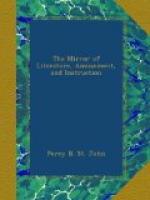* * * * *
SPIRIT OF THE PUBLIC JOURNALS.
THE TWO MUNCHAUSENS.
By a veteran.
In the late —— Regiment of Light Dragoons, were two worthy persons, who were denominated the regimental liars: a distinction to which, giving every man his due, they were eminently entitled. The great and fundamental requisites for accomplished lying, I conceive to be a good memory, a fertile fancy, a ready wit, fluency of speech, and a brazen countenance, so that you shall tell a man a most bare-faced falsehood, and afterwards adduce such connected proofs as especially characterize actual facts. The following dialogue is a specimen of the talents of the aforementioned mendacious personages.
C.—“See a man walk after he was shot dead! so have I, a whole day’s march.”
B.—“Come, come, that’s stealing a march on our senses. No, no, it won’t do: that’s a naked one; do pray turn them out with some kind of probability covering over them.”
C.—“What, doubt my veracity;”
B.—“Not for the world; that would be illiberal and unkind, and by the way, now I think on it, I believe the possibility of a man travelling without his cranium, for at the battle of Laswaree, during that desperate contest for British India, I saw a sergeant of the seventy-sixth shot dead; yet the fellow pursued his antagonist some hundred yards afterwards, threatening vengeance on the miscreant for having robbed the service of one of its best men. Finding himself weak from loss of blood, he deliberately unscrewed his head, threw it violently at the foe, and took him on the spine; down he tumbled; the veteran jumped upon him; fearful was the struggle; chest to chest, fist to fist; at last they joined in the death grapple, and dreadful indeed was their dying hug.”
C.—“My dear friend, I was an eye witness of the whole transaction. You have however forgotten the best part of the story. After the sergeant had well pummelled his enemy, he picked up his head again, and thrust into a neighbouring great gun: from the want of his peepers he made a random shot, and killed the horse on which Lord Lake was riding—his Lordship saluted the sod.”
B.—“I recollect it perfectly; for the nose of the said sergeant (recognised by sundry carbuncles) was so hard, that the following day it was extracted from the abdomen of the unfortunate animal.”
C.—“You make a mistake about the nose; it was discovered lodged in a loaf in a corporal’s knapsack; the man could swear to it, for it was perforated by three balls, and otherwise curiously marked. Report said that a shell had once blown it completely off, and that it was stitched on again by a shoe-maker, who, ever after, went by the name of the nosy cobbler.”




